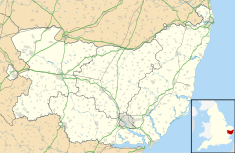Old Town Hall, Dunwich
| Old Town Hall | |
|---|---|
 The building in 2008 | |
| Location | St James's Street, Dunwich |
| Coordinates | 52°16′39″N 1°37′52″E / 52.2774°N 1.6311°E |
| Built | c.1705 |
| Architectural style(s) | Tudor style |
Listed Building – Grade II | |
| Official name | Old Town Hall |
| Designated | 16 January 1984 |
| Reference no. | 1198313 |
The Old Town Hall is a former municipal building in St James's Street in Dunwich, a village in Suffolk, England. The building, which is currently operates as holiday accommodation, is a Grade II listed building.[1]
History
[edit]The first town hall in the town was a medieval structure which may have dated back to the time that King John visited the town and presented a charter in 1216.[2] It may well have also served as the headquarters of the local merchant's guild.[3] Following some coastal erosion, it was rebuilt on a new site in 1663.[4] However, the town was devastated by coastal flooding in 1702: St Peters Church was so badly damaged that it had to be dismantled, and the town hall was destroyed.[5][6][7]
Civic leaders decided to re-erect the whole town, including the town hall, some 0.25 miles (0.40 km) inland to protect it from the continuing coastal erosion.[8] The new town hall was designed in the Tudor style, built using timber frame construction techniques and completed a few years later, probably about 1705. The design involved a symmetrical main frontage of two bays facing onto St James's Street.[1] The town archives were locked in an ancient iron chest, made in The Netherlands and kept in one of the rooms in the building.[9]
Dunwich had a very small electorate and, as most of the town had disappeared under the sea, it was recognised by the UK Parliament as a rotten borough.[10] Its right to elect members of parliament was removed by the Reform Act 1832,[11] and its borough council, which met in the town hall, was reformed under the Municipal Corporations Act 1883.[12] The assets of the corporation, including the town hall,[13] were transferred to a specially formed entity, the Dunwich Town Trust, with the lord of the manor, Colonel St John Barne of Sotterley Manor, becoming the first chairman of the trust in 1889.[14] The town hall was subsequently converted for residential use and currently operates as holiday accommodation.[15]
Architecture
[edit]The building has a timber-framed core, with red brick external walls, with the facade being plastered, and a pantiled roof. It has two storeys and an attic, with two windows on each floor, and a single dormer window in the attic with wide bargeboards. The windows are in the Gothic style, with diamond lattice lights. There is a two-storey extension to the right, linking it to the next house, with a 20th-century door.[1][16] It was grade II listed in 1984.[1]
References
[edit]- ^ a b c d Historic England. "Old Town Hall (1198313)". National Heritage List for England. Retrieved 6 May 2024.
- ^ Cooper, Ernest R. (1939). "The Dunwich Charter of King John, of 1215" (PDF). Dunwich Trusts. Retrieved 4 May 2024.
- ^ Comfort, N. A. (1994). The Lost City of Dunwich. Terence Dalton. p. 39. ISBN 978-0861380862.
- ^ "Dunwich" (PDF). Suffolk History Explorer. p. 11. Retrieved 6 May 2024.
- ^ Gardner, Thomas (1754). An Historical Account of Dunwich, Anciently a City, Now a Borough. p. 94.
- ^ Froude, James Anthony; Tulloch, John (1878). Fraser's Magazine for Town and Country. Vol. 17. J. Fraser. p. 527.
- ^ Abbott, S. F. (1883). The History of the Ancient City of Dunwich, Suffolk. George S. Cook. p. 15.
- ^ Jobson, Allan (1975). Suffolk Miscellany. R. Hale. ISBN 9780709149989.
- ^ Thackeray, William Makepeace (1883). The Cornhill Magazine. Vol. 47. Smith, Elder & Co. p. 178.
- ^ "Parliamentary Reform Bill, For England". Hansard. 30 May 1832. Retrieved 21 December 2021.
- ^ "The History of Politics: The Rotten Boroughs of England". Julia Herdman Books. 18 April 2022. Retrieved 21 October 2019.
- ^ Municipal Corporations Act 1883 (46 & 46 Vict. Ch. 18) (PDF). 1883. Retrieved 18 April 2022.
- ^ "Dunwich Town Records". National Archives. Retrieved 6 May 2024.
- ^ "Dunwich Town Trust" (PDF). Charity Commission. Retrieved 6 May 2024.
- ^ "The Old Town Hall". Suffolk Secrets. Retrieved 4 May 2024.
- ^ "Dunwich Conservation Area Appraisal" (PDF). East Suffolk Council. Retrieved 4 May 2024.

